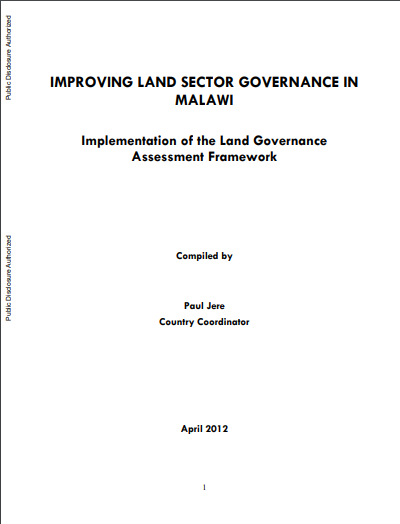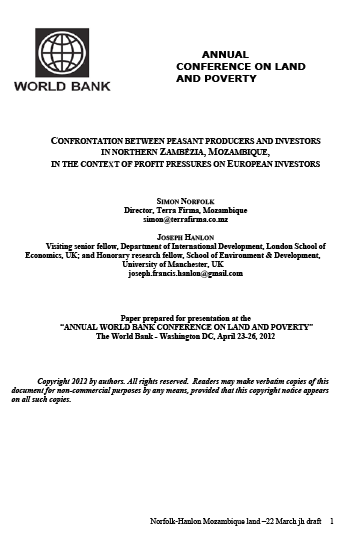The World Bank is a vital source of financial and technical assistance to developing countries around the world. We are not a bank in the ordinary sense but a unique partnership to reduce poverty and support development. The World Bank Group has two ambitious goals: End extreme poverty within a generation and boost shared prosperity.
- To end extreme poverty, the Bank's goal is to decrease the percentage of people living on less than $1.25 a day to no more than 3% by 2030.
- To promote shared prosperity, the goal is to promote income growth of the bottom 40% of the population in each country.
The World Bank Group comprises five institutions managed by their member countries.
The World Bank Group and Land: Working to protect the rights of existing land users and to help secure benefits for smallholder farmers
The World Bank (IBRD and IDA) interacts primarily with governments to increase agricultural productivity, strengthen land tenure policies and improve land governance. More than 90% of the World Bank’s agriculture portfolio focuses on the productivity and access to markets by small holder farmers. Ten percent of our projects focus on the governance of land tenure.
Similarly, investments by the International Finance Corporation (IFC), the World Bank Group’s private sector arm, including those in larger scale enterprises, overwhelmingly support smallholder farmers through improved access to finance, inputs and markets, and as direct suppliers. IFC invests in environmentally and socially sustainable private enterprises in all parts of the value chain (inputs such as irrigation and fertilizers, primary production, processing, transport and storage, traders, and risk management facilities including weather/crop insurance, warehouse financing, etc
For more information, visit the World Bank Group and land and food security (https://www.worldbank.org/en/topic/agriculture/brief/land-and-food-security1
Resources
Displaying 4016 - 4020 of 4907Doing Business 2012 : Doing Business in a More Transparent World
Ninth in a series of annual reports comparing business
regulations in 183 economies, Doing Business 2012 measures
regulations affecting 11 areas of everyday business activity:
• starting a business
• dealing with construction permits
• employing workers
• registering property
• getting credit
• protecting investors
• paying taxes
• trading across borders
• enforcing contracts
• closing a business
• getting electricity
Global Monitoring Report 2012 : Food
Prices, Nutrition, and the Millennium Development Goals
Every year, the Global Monitoring Report
(GMR) gauges progress across the Millennium Development
Goals (MDGs), so we can better understand whether we are
delivering on basic global needs. These needs include
affordable, nutritious food; access to health services and
education; and the ability to tap natural resources
sustainably whether clean water, land for urban expansion,
or renewable energy sources. We assess how well the world is
Geography of Growth : Spatial
Economics and Competitiveness
This volume is organized as follows.
Chapter one address two questions: how has spatial
concentration evolved with growth and development, and what
are the efficiency implications of too much or too little
spatial concentration? This chapter summarizes the various
models that analyze growth by geographic concentration and
sets the foundation for concepts discussed in later
chapters. Chapter two focuses on urbanization in
Improving land sector governance in Malawi : Implementation of the land governance assessment framework (English)
The Land Governance Assessment Framework (LGAF) is a diagnostic tool to assess the status of land governance at country level using a participatory process that draws systematically on existing evidence and local expertise rather than on outsiders.
Confrontation between peasant producers and investors in northern Zambézia, Mozambique, in the context of profit pressures on European investors
Foreign agricultural investors are clashing with local peasants in Mozambique, in a confrontation over agricultural and development models. Foreign investors looking a apparently vacant land promise high (often inflated) profits to investors and local partners. Some hope to capitalise on carbon credits or produce biofuels, and claim to be green investments. All promise jobs, schools, and local development. Local backers support the outside investors and their plantations with terms like "progress" and "modernisation".








